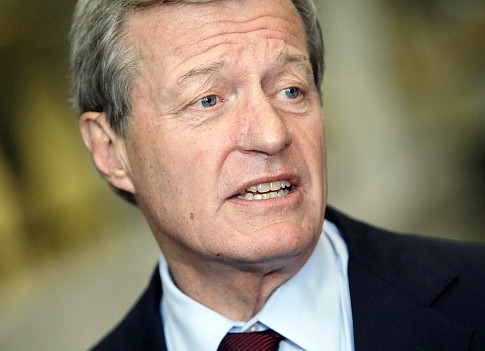Last week, we reported that Sen. Max Baucus (D-MT) had mused aloud at a committee hearing that perhaps a two-year transportation reauthorization was a better option in the current political and economic environment than a six-year bill. "We don't have a lot of money here," he said.

And at the current rate, under a six-year program, the number of dollars spent per year [would be] reduced. If we take the six years at the current funding level, annual funding payments would [go down] approximately from current $42 [billion] down to $28 [billion] -- unless we find new revenue. [Ed. note: that number is just for highways.] I don’t think we want to be in that position where it’s only 28. That’s a huge blow to our country. Which raises the question of a six-year versus a two-year bill. And I raise that because if we can’t find revenue for a full six-year bill, might be better to go for a shorter [one] which is fully funded for at least those two years.
State DOT officials quickly interjected that they didn’t think it was a good idea.
Indeed, most political and industry leaders have strongly supported a six-year bill. Transportation Committee Chair John Mica told state DOT officials last month, “Anyone who talks about anything less than a six-year bill, I’ll take you outside and beat the crap out of you.”
Some people are lining up to take that beating.
In addition to Baucus, Robert Puentes of the Brookings Institution took an opportunity to reiterate his previous support of a two-year bill.
Such an authorization would avoid the current political rancor and the challenges of discussing a necessary increase in the federal gasoline tax during the presidential election campaign in 2012. There is the added hope that the national economy will have recovered sufficiently by then to make such a conversation possible.
Puentes acknowledges that ideally, everyone prefers a six-year bill, but a two-year bill is still better than constant extensions, as we’ve had for the last 18 months since SAFETEA-LU expired. And it might be better than a six-year bill at starvation levels. “The hope is that by the time the trust fund starts running a negative balance in 2012, that will force a conversation about raising revenue,” he said, “specifically the gas tax.”
Given that projected trust fund revenues diminish steadily into negative territory over the next six years, looking only at the next two years would allow for slightly higher expenditures, but still nothing close to the robust investment needed to start addressing the nation's massive infrastructure backlog. And a Congress filled with deficit hawks won't consider spending more than the Highway Trust Fund brought in -- even for just two years.
Besides, the construction industry and the states are on their knees begging for a long-term bill. Donna Cooper, who served as Pennsylvania Governor Ed Rendell's secretary of policy, said short term reauthorizations are very inefficient ways to do infrastructure spending. "You need the multi-year horizon to go from design to construction," she told Streetsblog. "Otherwise you interrupt that process and you can't keep your construction pipeline going."
She said the stimulus bill "cleaned out the closet of all the projects that could be done quickly" and now it's time for a multi-year bill to plan, design, and build longer-term projects.
And then there's the political calculation. Many political pundits predict that the Senate will fall to the GOP in 2012, meaning that by putting off negotiations on a long-term bill by two years, Democrats will find themselves in the minority in not one but two houses, and the only power they'll have is the presidential veto.
But Cooper has a different perspective. She said having an unfinished infrastructure bill could help the Democrats in the 2012 election.
If I was the Republicans I'd try to get it done ahead of time because i don't think this is a good election issue for the Republicans. The American public wants to see responsible, smart infrastructure investment and I think they'll worry, with the Republican party as it stands now, having such a strong anti-investment approach, "these guys aren’t going to build my road; I'm going to continue to sit in traffic; I'm not going to get that rail system."





